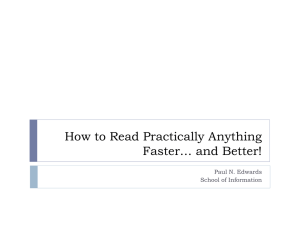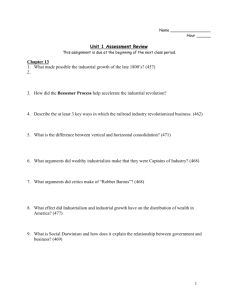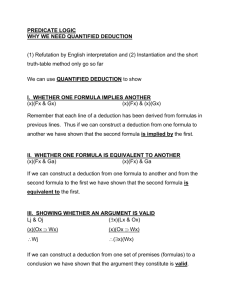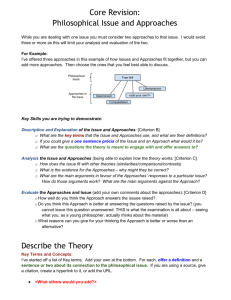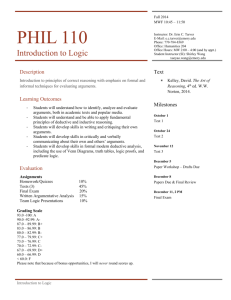Logic - Erin C. Tarver
advertisement
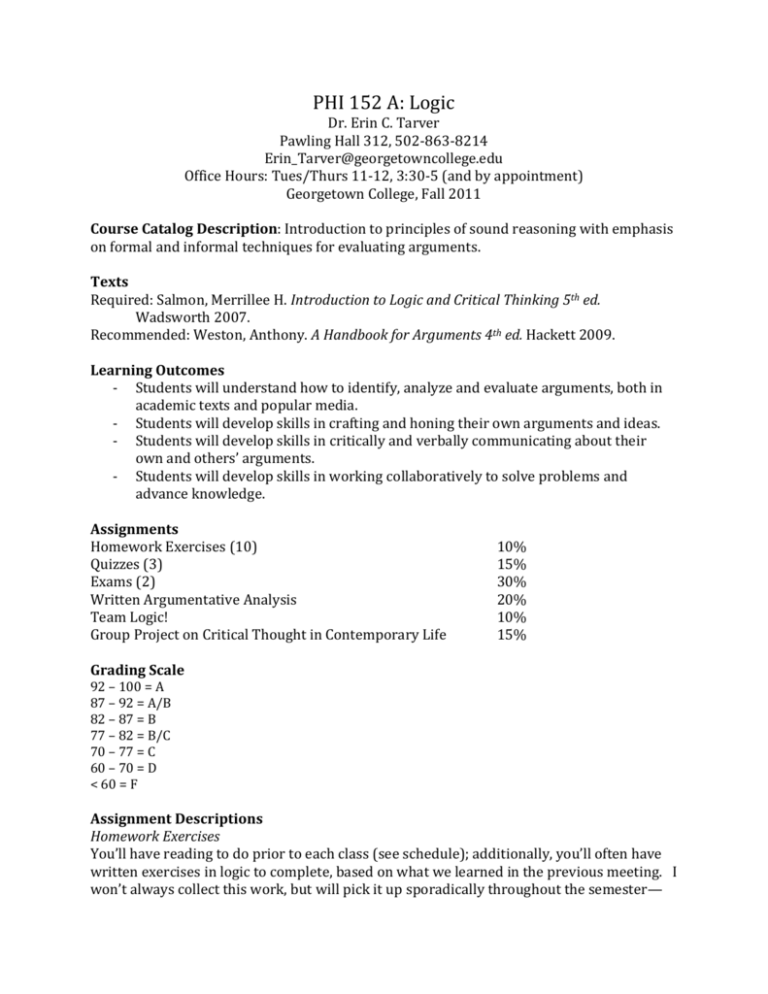
PHI 152 A: Logic Dr. Erin C. Tarver Pawling Hall 312, 502-863-8214 Erin_Tarver@georgetowncollege.edu Office Hours: Tues/Thurs 11-12, 3:30-5 (and by appointment) Georgetown College, Fall 2011 Course Catalog Description: Introduction to principles of sound reasoning with emphasis on formal and informal techniques for evaluating arguments. Texts Required: Salmon, Merrillee H. Introduction to Logic and Critical Thinking 5th ed. Wadsworth 2007. Recommended: Weston, Anthony. A Handbook for Arguments 4th ed. Hackett 2009. Learning Outcomes - Students will understand how to identify, analyze and evaluate arguments, both in academic texts and popular media. - Students will develop skills in crafting and honing their own arguments and ideas. - Students will develop skills in critically and verbally communicating about their own and others’ arguments. - Students will develop skills in working collaboratively to solve problems and advance knowledge. Assignments Homework Exercises (10) Quizzes (3) Exams (2) Written Argumentative Analysis Team Logic! Group Project on Critical Thought in Contemporary Life 10% 15% 30% 20% 10% 15% Grading Scale 92 – 100 = A 87 – 92 = A/B 82 – 87 = B 77 – 82 = B/C 70 – 77 = C 60 – 70 = D < 60 = F Assignment Descriptions Homework Exercises You’ll have reading to do prior to each class (see schedule); additionally, you’ll often have written exercises in logic to complete, based on what we learned in the previous meeting. I won’t always collect this work, but will pick it up sporadically throughout the semester— usually without warning. The ten assignments I pick up will be graded purely on the basis of their completion, not graded for correctness. Nevertheless, I can’t stress strongly enough how important it is for you to do these exercises seriously and consistently. Logic is like working out: a few lucky ones of us can jump in and perform on command, but for the vast majority of folks, without regular, dedicated practice, serious efforts (i.e., tests) will be painful and even disastrous. So, think of this class as P90X for your brain. Be prepared to bring it every day. Quizzes There will be 3 quizzes over the course of the semester. See schedule for dates. Note that I do not schedule make-up quizzes unless you are absent for an official university event (athletics, debate, etc.) or documented illness. Exams There will be two exams in this class: a mid-term and a final. All exams are cumulative. Missed exams may only be made up in the case of an absence for an official university event or documented illness. Written Argumentative Analysis One of the most important things you’ll learn to do in this class is to read and write carefully about your ideas and the ideas of others. This is where you’ll hone those skills. Using short arguments that you make during the first week of class, you’ll analyze your own reasoning and critically respond to it in a short paper of 2-3 pages. We will complete this assignment in stages. See schedule for dates. Team Logic! In the first week of classes, you’ll divide into teams. One day each week, one team will be responsible for providing original examples relevant to the current material, and serving as the point-people for explanations of the exercises for that section. This means that you’ll meet with your teammates regularly outside of class to work on your group’s in-class contribution of logic examples and explanations. I’ll give you a schedule indicating your team’s dates after teams have been formed. To get a good score on this, you need to 1) show up on your team’s game days (no one coasts on their teammates efforts!), 2) work together collaboratively and take turns speaking, and 3) use some imagination—extra marks for teams that can make their examples both fun and accurate. Group Project: Critical Thinking in Everyday Life Ideas and arguments are all around us: underlying our social and political practices, permeating our advertising as much as our religious life, and cropping up in everything from film to music to debate to public policy. Your job in this assignment is to analyze, with your fellow group members, an argument presented in some piece of contemporary life, and give a 20 minute presentation on it. What does the argument say, and how does it say it? What sorts of reason-giving does it use? Is the argument persuasive to people, and should it be? How could we reformulate the argument to make it better? Creative methods of presentation (multi-media, theatrical, audience-engaging, etc.) are strongly encouraged. Schedule 8/29 – Intro: What is Logic? Am I logical? Who cares? 8/31 – Arguments and Evidence 1-I [IN CLASS OWN ARGUMENT) 9/2 - Arguments and Evidence 1-II and 1-III 9/5 – LABOR DAY, NO CLASS 9/7 – Arguments 1-IV – 1-V1 9/9 – Arguments 1-V2 – 1-VI 9/12 – Language and Arguments 2-I – 2-III 9/14 – Language and Arguments 2-IV – 2-V 9/16 – Language and Arguments 2-VI 9/19 – QUIZ 1; Distinguishing Types of Arguments 3-I 9/21 – Introducing Deductive Arguments 3-II (through pg 84 only) 9/23 – Introducing Deductive Arguments 3-II contd (84-90) 9/26 – GROUP PRESENTATION 1, Deductive Arguments Contd. 9/28 – Introducing Inductive Arguments 3-III 9/30 – Fallacies 3-IV 10/3 – Inductive/Deductive Review 3-V 10/5 – QUIZ 2, Induction 4-I – 4-II 10/7 – Induction 4-III 10/10 – GROUP PRESENTATION 2, Induction 4-IV 10/12 – Induction 4-V – 4-VI 10/14 – FALL BREAK, NO CLASS 10/17 – General Induction Review 4-VII 10/19 – Causal Arguments 5-I – 5-III 10/21 – NO CLASS, DR. TARVER AT CONFERENCE 10/24 – GROUP PRESENTATION 3, Causal Arguments and Fallacies 5-VI 10/26 –Causality Cont. and Exam Review 5 – VII 10/28 – EXAM I 10/31 – Deduction and Senential Logic 8 – I-III 11/2 – Deduction: Conditionals 8 – IV 11/4 – Deduction: Conditionals 8 – V 11/7 – Deduction: Conditional Syllogisms 8 – VI 11/9 – GROUP PRESENTATION 4, Syllogisms contd. 11/11 – Deduction: Symbolizing Arguments 8 – VII -VIII 11/14 – Deduction, Truth Value and Validity/Invalidity 8 – IX-X 11/16 – QUIZ 3; Deduction and Validity/Invalidity contd. 11/18 – Tautologies, Self-Contradictions and Contingencies 8 – XI 11/21 – GROUP PRESENTATION 5, Deduction and Conditionals Review 8 – XII 11/23 – Deduction and Conditionals Review Contd. 11/25 – THANKSGIVING BREAK, NO CLASS –REVIEW WRITING PROJECT 11/28 – Deduction: Categoricals 9 – I-II 11/30 – Deduction: Categoricals 9 – III-IV 12/2 – Deduction: Categoricals 9 – V-VI 12/5 – Deduction: Categoricals 9 – VII-IX 12/7 – Deduction: Categoricals Review 9 – X 12/9 – IN CLASS WRITING WORKSHOP, BRING DRAFT OF WRITTEN ASSIGNMENT; Deduction: Categoricals contd. 12/12 – FINAL WRITING ASSIGNMENT DUE, Exam Review 12/15 – EXAM 2, 12:00 PM Classroom Conduct We’re going to talk quite a bit about arguments in this class—and we’ll definitely have a few of our own!—but that doesn’t mean that we don’t have ground rules. In fact, being respectful of one another, even when we disagree, is absolutely crucial to making this an environment in which everyone can learn. There are several ways we can show one another respect; the following are the ones I insist upon: - We may attack ideas, but never people. Listen to others when they’re talking. Don’t use cell phones or computers in the classroom. Any other ground rules we agree upon as a group Academic Honesty Academic Honesty is extremely important, and so violations of the Georgetown College Honor System will not be tolerated. I will not hesitate to fail a student for the course for such violations. Infractions of the Honor System include plagiarism, cheating, stealing, and lying related to academic matters. Definitions of these infractions are available in the Georgetown College Student Handbook. Disability Access I encourage any students with disabilities that may impact their access to or performance in any component of this course to talk with me or Disability Support Services as soon as possible. Disability Support Services is located in the Student Wellness Center.

